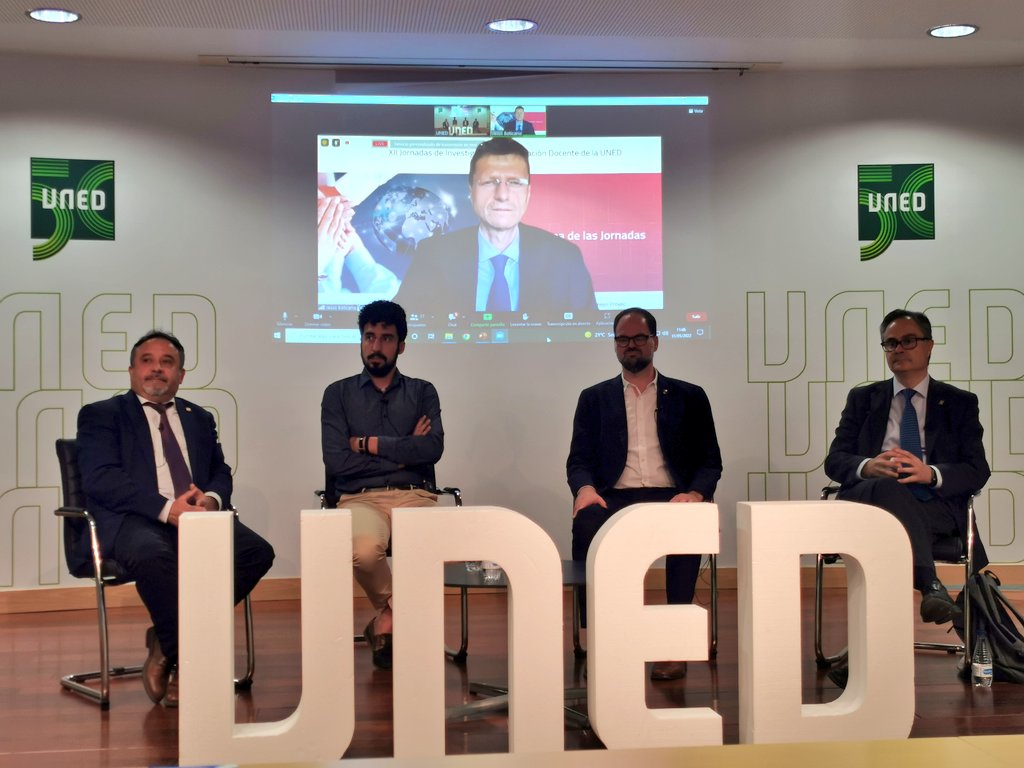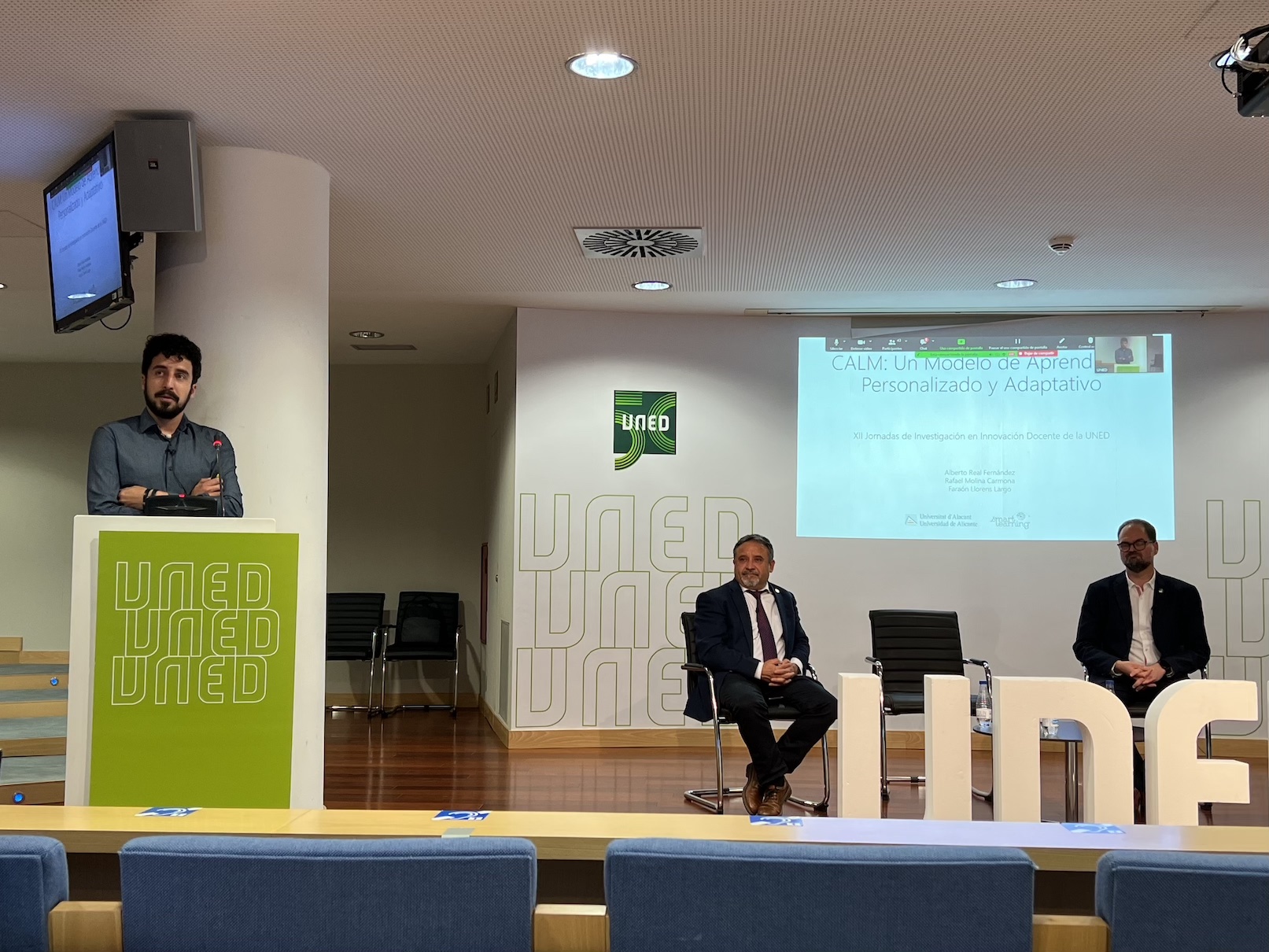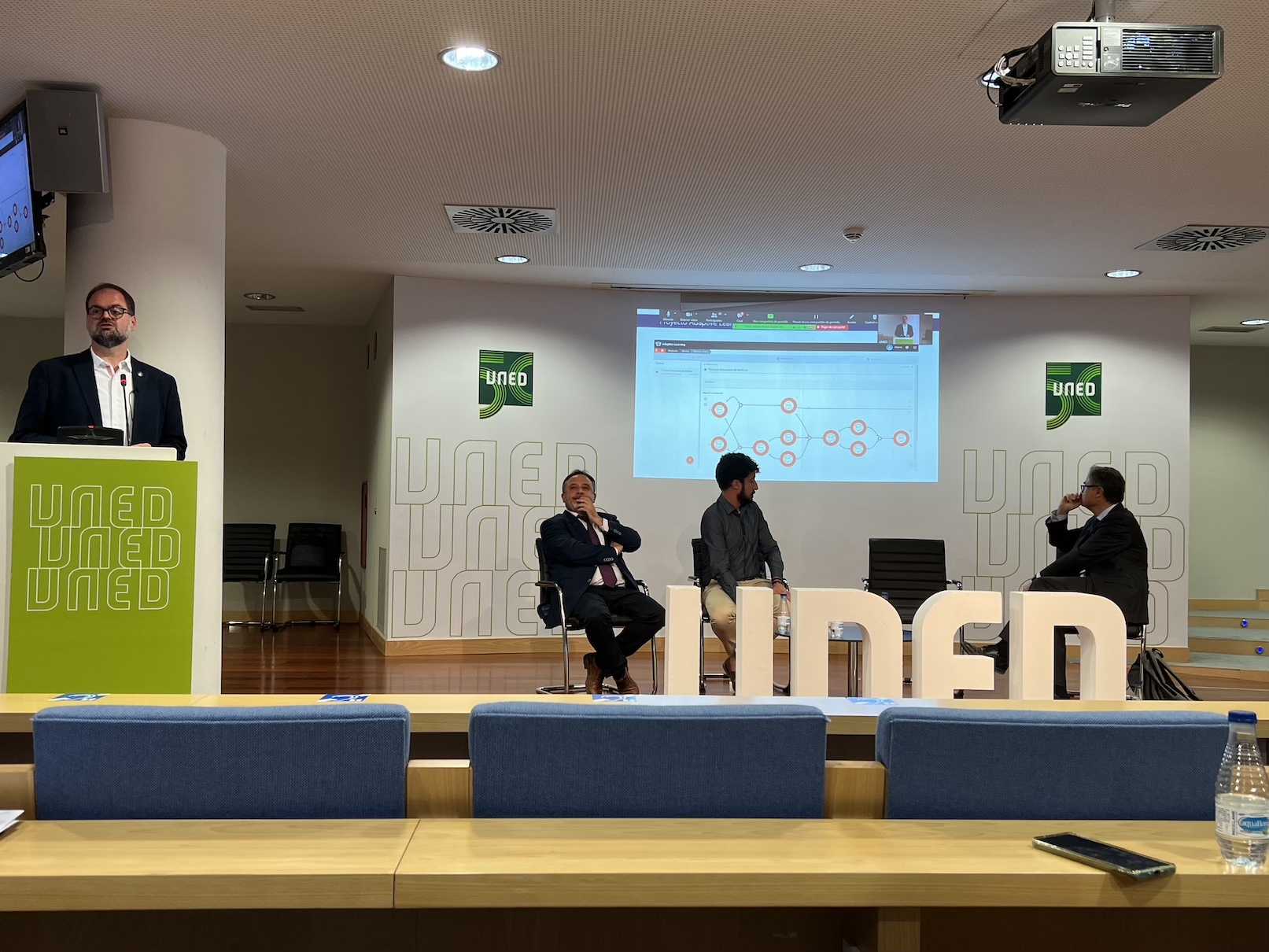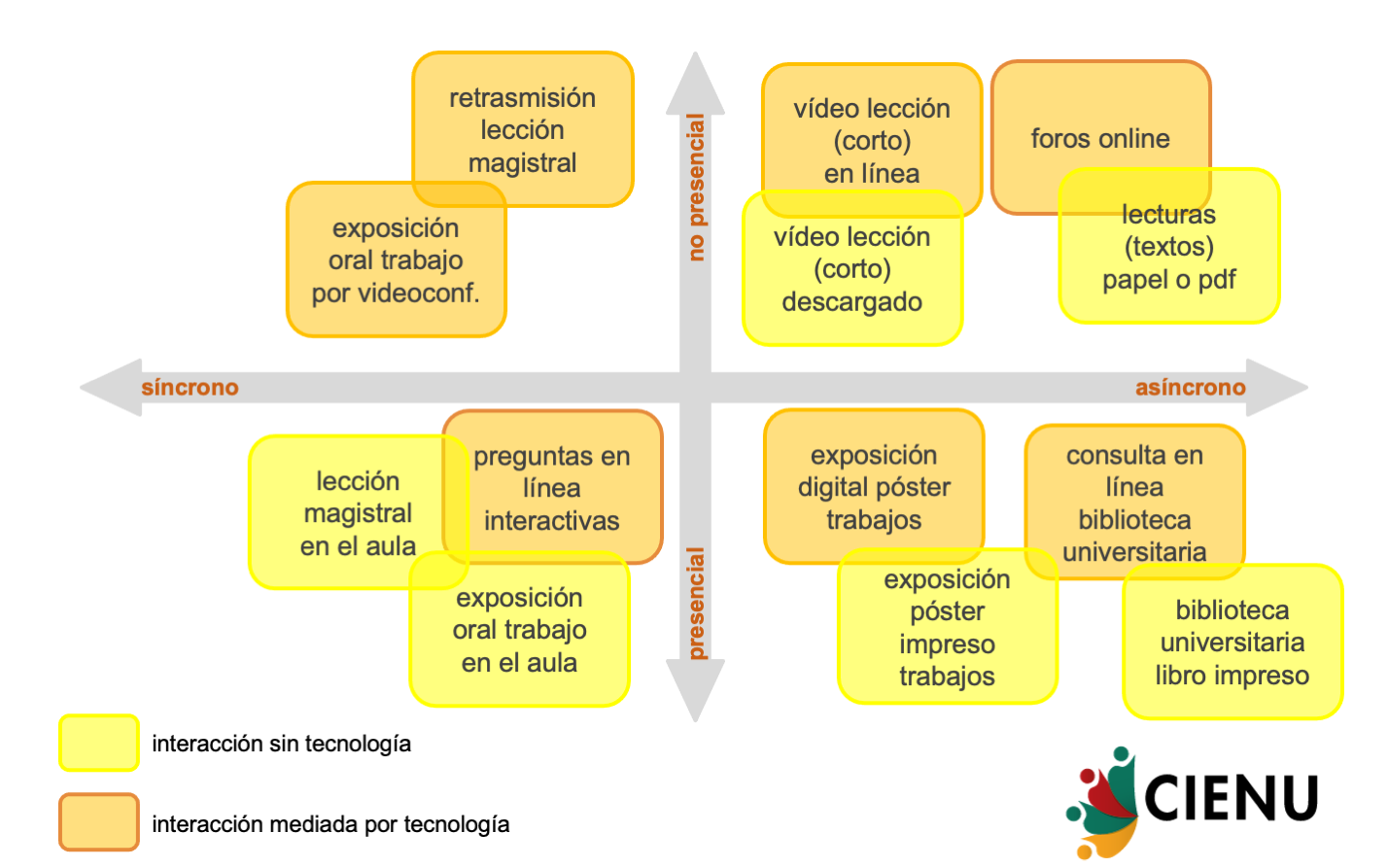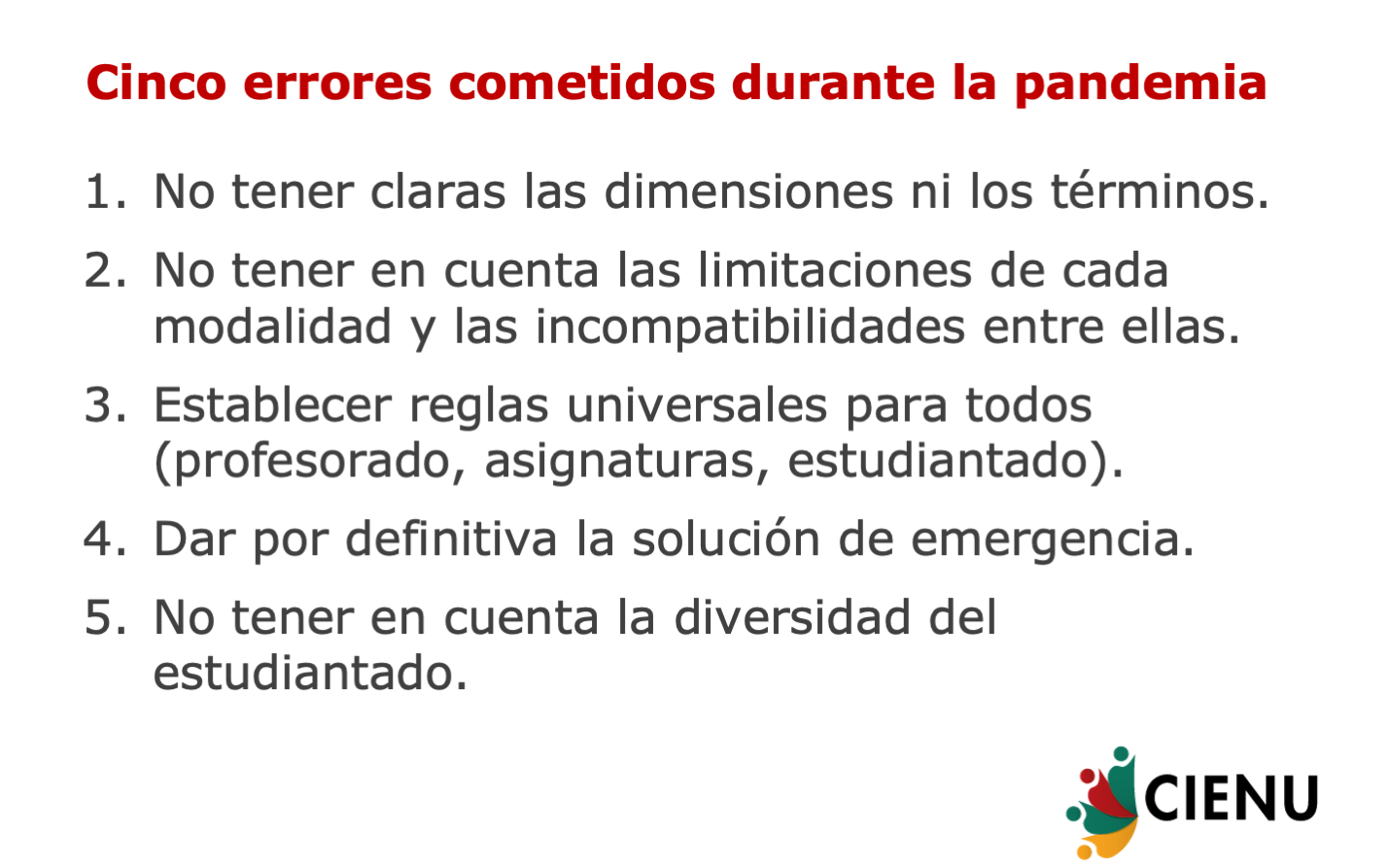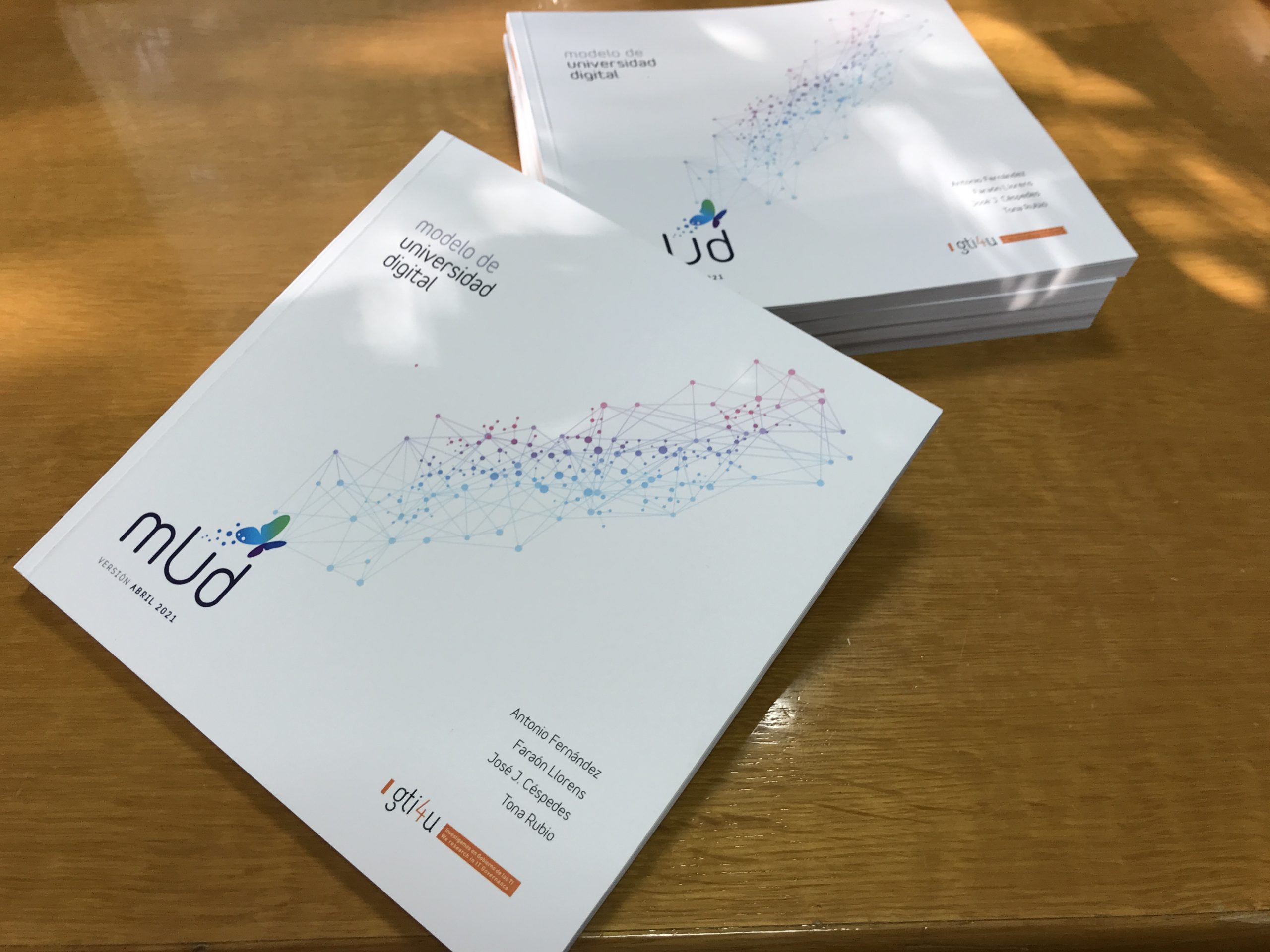Home » Innovación educativa (Page 5)
Category Archives: Innovación educativa
CALM: un modelo de aprendizaje adaptativo y personalizado
CALM: un modelo de aprendizaje adaptativo y personalizado
XII Jornadas de Investigación en Innovación Docente de la UNED
Vicerrectorado de Digitalización e Innovación
Instituto Universitario de Educación a Distancia (IUED)
31 mayo y 1-2 junio del 2022
https://multiweb.uned.es/w26610
Martes 31 de mayo
Proyectos UniDigital. Fondos europeos de recuperación y resiliencia
Moderador: Jesús González Boticario. Vicerrector de Digitalización e Innovación. UNED
Proyecto DigitALL. Ismael García Varea. Vicerrector de Transformación y Estrategia Digital. Universidad de Castilla la Mancha.
Proyecto DigCompEdu. Juan Ramón Velasco. Vicerrector de Innovación Docente y Transformación Digital. Universidad de Alcalá de Henares.
Proyecto CALM: un modelo de aprendizaje adaptativo y personalizado. Rafael Molina Carmona y Alberto Real Fernández. Adaptive Learn. Universidad de Alicante.
Vídeo en canal UNED:
https://canal.uned.es/series/623c24f6b609230d541258f8
Dimensiones a considerar en el proceso de enseñanza- aprendizaje
Dimensiones a considerar en el proceso de enseñanza- aprendizaje
Faraón Llorens (UA), Fermín Sánchez (UPC), David López (UPC), José Manuel Badía (UJI) y María Jesús Marco (UOC)
CIENU – 1er Congreso Internacional de Enseñanza Universitaria
Universidad Autónoma de Querétaro (México)
20 de mayo de 2022
Grabación en directo (1:12:35)
Teaching Machines
Teaching Machines
The history of personalized learning
Audrey Watters
The MIT Press
https://mitpress.mit.edu/books/teaching-machines

Summary:
Contrary to popular belief, ed tech did not begin with videos on the internet. The idea of technology that would allow students to “go at their own pace” did not originate in Silicon Valley. In Teaching Machines, education writer Audrey Watters offers a lively history of predigital educational technology, from Sidney Pressey’s mechanized positive-reinforcement provider to B. F. Skinner’s behaviorist bell-ringing box. Watters shows that these machines and the pedagogy that accompanied them sprang from ideas—bite-sized content, individualized instruction—that had legs and were later picked up by textbook publishers and early advocates for computerized learning.
Watters pays particular attention to the role of the media—newspapers, magazines, television, and film—in shaping people’s perceptions of teaching machines as well as the psychological theories underpinning them. She considers these machines in the context of education reform, the political reverberations of Sputnik, and the rise of the testing and textbook industries. She chronicles Skinner’s attempts to bring his teaching machines to market, culminating in the famous behaviorist’s efforts to launch Didak 101, the “pre-verbal” machine that taught spelling. (Alternate names proposed by Skinner include “Autodidak,” “Instructomat,” and “Autostructor.”) Telling these somewhat cautionary tales, Watters challenges what she calls “the teleology of ed tech”—the idea that not only is computerized education inevitable, but technological progress is the sole driver of events.
Enlaces de interés:
Hack Education (hackeducation.com)
Frases entresacadas e ideas interesantes que puedo utilizar:
(Página )
“ ”
Dopamina
Dopamina
Daniel Z. Lieberman y Michael E. Long
Ediciones Península
Cómo una molécula condiciona de quién nos enamoramos, con quién nos acostamos, a quién votamos y qué nos depara el futuro
https://www.planetadelibros.com/libro-dopamina/336714
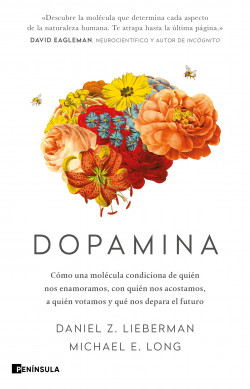
Frases entresacadas e ideas interesantes que puedo utilizar:
(Página )
“”
Modelo de Universidad Digital (mUd)
Modelo de Universidad Digital (mUd)
Antonio Fernández, Faraón Llorens, José J. Céspedes y Tona Rubio
Colección: Cátedra Santander-UA de Transformación Digital
Publicaciones de la Universidad de Alicante
Descarga desde RUA:
http://rua.ua.es/dspace/handle/10045/116047
Resumen:
Los cambios importantes en el entorno social, económico, laboral y tecnológico están en la base de los retos fundamentales que las universidades han tenido y tienen que afrontar en los próximos años. No se trata simplemente de una drástica alteración del entorno competitivo de las instituciones de educación superior, sino también de cuestionarse su propia justificación y legitimación como organizaciones responsables ante la sociedad de la generación y transmisión de conocimientos útiles y relevantes. Así, por un lado, las universidades se ven abocadas a intentar transformarse para poder participar en un mercado cada vez más competitivo en la atracción de estudiantes, personal y los recursos que se necesitan para desarrollar las funciones de educación, investigación e innovación y transferencia. Por otro lado, estas mismas funciones tienen que afrontar importantes cambios para responder a retos como el cambio climático, los objetivos de sostenibilidad a nivel mundial o las crisis sanitarias. La universidad capaz de afrontar estos problemas a partir de una transformación apoyada en las tecnologías digitales emergentes es lo que hemos llamado Universidad Digital.
Enlaces de interés:
GTI4U (Gobierno de las TI para Universidades)
Transformación digital del binomio enseñanza+aprendizaje
Transformación digital del binomio enseñanza + aprendizaje
Faraón Llorens
9 de diciembre de 2021
Programa
Congreso de educación, innovación y nueva normalidad (CEINN 2021)
8-10 de diciembre de 2021
http://www.ceinn.andiac.org
Vídeo en directo (2:57:37):
Mi intervención hasta minuto 55
https://www.facebook.com/CIIDE.DURANGO/videos/685714502833595
International workshop on innovation, transfer and research in University Education in Engineering
International Workshop on Innovation, Transfer and Research in University Education in Engineering
November 29, 2021
Institute «Center of Operations Research»
Universidad Miguel Hernández, Spain
Sponsored by Conselleria de Innovación, Universidades, Ciencia y Sociedad Digital
Workshop Chair – Oscar M Bonastre
Round Table: Innovating in Engineering Education: COVID Experience (Spanish)
- Concepción Parejo Prados, Deputy Director of Quality and Institutional Relations of the Higher Polytechnic School of Elche, Universidad Miguel Hernández, Elche, Spain
- Pedro Muñoz, Team Coordinator EU Project “LALA: Building Capacity to Use Learning Analytics to Improve Higher Education in Latin America», Team member of “eMadrid: Research and development network about e-learning technologies in the Madrid Region “, Universidad Carlos III de Madrid, Spain.
- Rafael Molina, Vice Rector for Digital Transformation. Head of the Education Laboratory of the Scientific Unit for Business Innovation «Ars Innovatio», Agència Valenciana de la Innovació. Universidad de Alicante, Spain.
- Manuel Caeiro, President of the Spanish Chapter IEEE Education Society (CESEI) 2018-19. Universidad de Vigo, Spain
- Faraón Llorens, President Association of University Lecturers and Professors of Informatics (AENUI), Past Vice Rector for Technology and Educational Innovation, Universidad de Alicante, Spain.
Moderator: Cristina Fernández, Board of Governors, IEEE Education Chapter, Spain Section, Universidad Carlos III de Madrid, Spain.
How Suitable is for Learners an Autonomous, Interactive and Dynamic Learning Model?
How Suitable is for Learners an Autonomous, Interactive and Dynamic Learning Model?
Alberto Real-Fernández, Rafael Molina-Carmona, Faraón Llorens-Largo
Digitalized Resources and Artificial Intelligence based Solutions to Support Personalized Teaching and Learning at Higher Education: What is Beyond 2021? (DRAI)
WEEF/GEDC 2021 (weefgedc2021.org)
(World Engineering Education Forum)
Diversity and ethics in education for an inclusive ans sustainable world
15th-18th November 2021
Madrid, Spain
A. Real-Fernández, R. Molina-Carmona and F. Llorens-Largo, “How Suitable is for Learners an Autonomous, Interactive and Dynamic Learning Model?,” 2021 World Engineering Education Forum/Global Engineering Deans Council (WEEF/GEDC), 2021, pp. 617-623, doi: 10.1109/WEEF/GEDC53299.2021.9657378.
Abstract:
Facing the traditional static learning, a smart learning system that proposes a dynamic, interactive and autonomous learning is proposed. Based on the concepts of learning competence and learning activity, this system aims to fulfill the current individual needs of the learners and to be a support tool for the teacher to understand their learners’ needs and performance. In order to validate the features of the model, and verify how suitable it is for the learners, a platform has been developed which implements its structure and main concepts to be used in a course. Then both teachers and learners have been asked about their experience. Concretely, the main features selected to validate include motivation, interaction, progression, the fact of knowing the learning state at any time, that learners can be autonomous by marking their own learning pace and selecting their own learning path, the continuous learning cycle the system will implement and the usefulness of the system as a teaching tool. All these features are considered crucial for the proposal and, after analysing the results of the survey and interviews, it has been confirmed that the system have achieved them.
Curso Internacional para Rectores sobre Estrategia y Transformación Digital de la Universidad (2da edición – grupo 1)
Curso Internacional para Rectores sobre Estrategia y Transformación Digital de la Universidad
2da edición – grupo 1
Banco Interamericano de Desarrollo (BID)
Metared
https://learning.edge.edx.org/course/course-v1:IDBx+IDB42x+3T2021/home
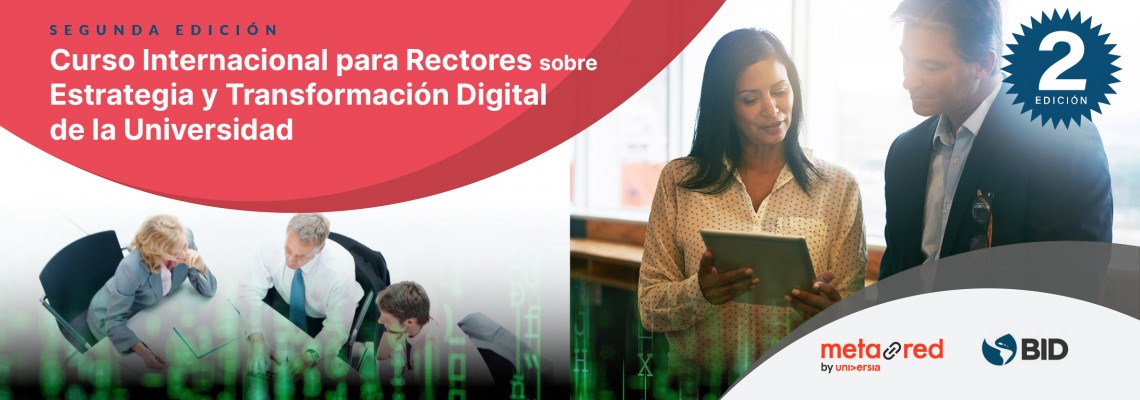
Hoy ha tenido lugar la sesión síncrona por videoconferencia de cierre a los módulos 3 y 4.
Oportunidades, Estrategia y Gobierno de la transformación digital
En esta sesión mediante videoconferencia, los rectores y las rectoras participantes, podrán debatir y reflexionar sobre la aplicación de los conceptos vistos en los módulos 3 y 4, en sus respectivas universidades. Los profesores guiarán el debate, a través de una actividad participativa, y aprovecharán para complementar los temas tratados en los materiales del curso.
Encuentro Virtual del Grupo de Gestión de Tecnología Educativa 2021
Indicadores de Madurez enfocados a Tecnología Educativa
Faraón Llorens
Conferencia
Encuentro Virtual del Grupo de Gestión de Tecnología Educativa
26 de octubre de 2021
Encuentro ANUIES-TIC 2021 Virtual
“Perspectivas y retos de la educación digital en las Instituciones de Educación Superior”
27, 28 y 29 de octubre de 2021, México
En colaboración con la UDLAP
Encuentro virtual
